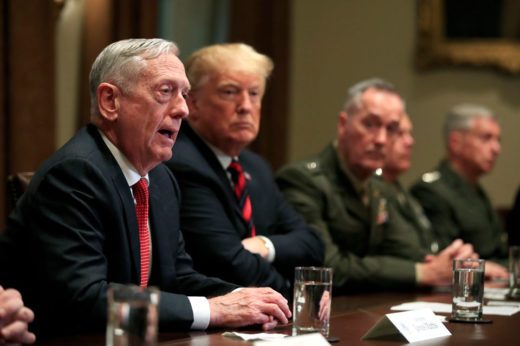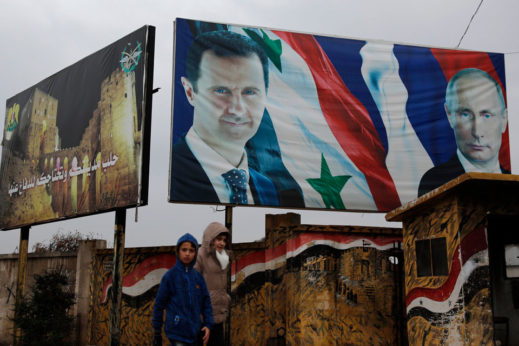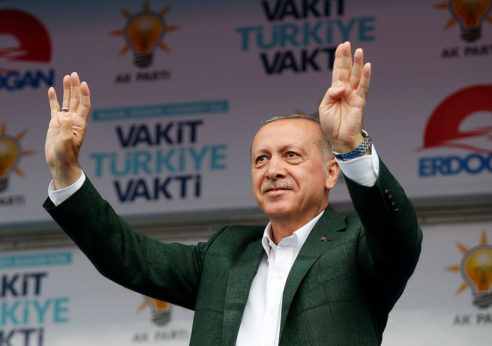
The announced withdrawal of 2,000 U.S. military personnel from Syria by President Trump on Wednesday, Dec. 19, along with the pull out of 7,000 troops from Afghanistan, has precipitated a new and deeper crisis in the administration. Defense Secretary Jim Mattis resigned late in the evening on Thursday, Dec. 20, in protest over the decisions. Mattis, who has had longstanding policy disagreements with Trump, was said to be the last major restraint within the administration to Trump’s impulsive decisions and erratic behavior.
With the Mueller investigation closing in on Trump’s criminal conduct and the Republicans’ stunning November election losses, Trump is in what has been described by administration officials as a “tailspin.” Trump is increasingly brooding, isolated, and erratic. These new developments could open the door to a far more dangerous phase of his presidency.
Trump justified the troop withdrawal on the basis that the extremist group Islamic State, or ISIS, was defeated, although many analysts see it differently. But the abrupt manner in which it happened raises many questions and concerns.

What are the likely consequences? Were the decisions made to placate Trump’s right-wing base and distract from his growing legal jeopardy? Were they related to his family’s global financial entanglements? Or to demands by some of the actors who interfered in the 2016 election to help get him elected, including Russia? What pressures or requests are being made by U.S. allies Saudi Arabia and Turkey? Were U.S. troops a bargaining chip in some high stakes gambit?
Peace groups welcome the move
The troop withdrawal announcement has been welcomed by peace groups and anti-war veterans’ organizations who charge the uninvited U.S. presence in Syria is a breach of international law, part of a larger goal to oust the government of Bashar al-Assad, and a prelude to an eventual invasion of Iran.
They see the troop withdrawal as an opening to begin paring down the U.S. military footprint in the Middle East and Afghanistan, where the longest running war in U.S. history is into its 18th year. There are hopes that Trump’s move signals a first step toward de-escalating tensions across the region.
Peace organizations have called for a negotiated settlement to the Syrian conflict, the involvement of the United Nations, the withdrawal of all foreign forces and influences, and massive material aid to address the humanitarian crisis that has driven out hundreds of thousands of Syrian refugees and to rebuild the country.
Longtime U.S. and European imperialist policies in the Middle East region have been geared to control of oil production, lucrative military weapons sales, and the siting of strategic military bases. This key factor underlies U.S. support for reactionary regimes and monarchies.
Rivalries and distractions
But the Middle East crisis is also layered with rivalries and competitions for influence. There are the rivalries between regional powers like Iran, Saudi Arabia, Israel, and Turkey for dominance. Then there is the global jockeying for power that is underway, including that between two contending capitalist powers, the U.S. and Russia, which also welcomed the troop withdrawal announcement.
These factors have fueled years of war, massive destruction and loss of life, and political instability, while creating fertile grounds for the emergence of right-wing religious extremism, including the creation of ISIS.

Many pundits see the troop withdrawal as a fulfillment of one of Trump’s election pledges and as a move consistent with his “America First” foreign policy doctrine. Trump had been agitating for a withdrawal since early 2018. In the wake of the Republicans’ November 2018 mid-term election loss, and in the face of an increasingly restive and critical right-wing base, Trump may have figured it was a good time to gin up his support.
The president reportedly made the decision without consulting the military brass and State Department and went against his own national security advisor, John Bolton, the ardent neo-con who recently declared the U.S. was in Syria for the long run to counter Iran.
U.S. out, Turkey in?
The announcement was made after Trump had a lengthy phone call with Turkish President Recep Erdogan, whose government thereafter immediately announced its intention to conduct its own military invasion into Syria to wipe out Kurdish forces in the area east of the Euphrates River. These forces, led by the Kurdistan Workers Party, have been the main fighting force against ISIS extremists.

In response to an international outcry, Erdogan backtracked from the timetable for immediate invasion. Still, the immediate and unplanned withdrawal not only throws the Kurdish fighters under the bus, but it also threatens to unleash a new wave of bloodshed in the region. Some speculate it is only the presence of U.S. troops that has prevented a clash between Turkish and Kurdish forces so far.
Turkey has been obsessed with defeating Kurdish forces, particularly those associated with the Kurdistan Workers Party, and prevent the establishment of an autonomous Kurdish region within its borders. Erdogan, who has conducted a vicious campaign to eliminate his domestic opposition, sees the Kurds as a direct threat to his rule and the nationalist dream of creating a “greater Turkey” and restoration of the land mass of the Ottoman Empire.
On Dec. 15, Erdogan demanded the U.S. clear Kurdish forces from Manbij or he would invade. U.S. troops came under fire from forces allegedly supported by Turkey in October. A confrontation would have pitted two NATO member states, creating a crisis in NATO and possibly sparking a military confrontation between the two countries. There is already deep animosity in Turkey toward the U.S. and NATO.
On December 19—the same day as Trump’s withdrawal announcement—the U.S. and Turkey announced completion of an arms deal worth $3.5 billion, which came on the heels of a deal for a missile air defense system with Russia. Did Erdogan threaten to scuttle the deal if the U.S. didn’t pull its troops? And if so, did Trump get pressure from military contractors who would have profited off the sales?
The administration has also reopened the process for the extradition of Fethullah Gulen, the Turkish Muslim cleric and rival of Erdogan living in exile in Pennsylvania. Disgraced former Trump national security advisor Michael Flynn had been contracted as a lobbyist to oust Gulen, an episode which led to a guilty plea of lying to federal law enforcement officials.
Possible motives abound
But there may be any number of other factors at work.
Could it have had anything to do with Trump Organization business interests in Turkey? In 2015, Trump reaped $10 million in royalties from an Istanbul tower complex.
Or could it have been advice from Steve Bannon who is still in the mix as an informal advisor to Trump along with hosts of right-wing radio and television? Bannon recently stated the real danger to the “Christian West” is the possibility of a new global axis of China, Iran, and Turkey. His protégé, Stephen Miller, is still in the White House advising the president.
Turkey and China have been expanding their economic cooperation at a time of growing economic crisis in Turkey. Any increase of Chinese influence in the Middle East region is no doubt a concern of the U.S. foreign policy establishment.
The U.S. strategic doctrine sees China (along with Russia) as the chief global rival to U.S. economic and military domination. The goal is to undercut China economically and isolate it globally. This is the meaning of the Trump-initiated trade war.
Or could it have been family financial entanglements with Saudi Arabia?
Could it have been a demand by the Saudi regime for Turkey to lighten up on its accusations over the murder of journalist Jamal Khashoggi? Trump has had a long financial relationship with the Saudi royal family dating back to the 1990s when the Trump Organization was facing bankruptcy and New York banks refused to lend him a dime. He was forced to turn to the Saudi royal family and Russian oligarchs for cash.
The Saudi royal family bailed Trump out by buying his yacht and the Crown Plaza hotel and spent hundreds of thousands on rooms at the Trump International Hotel. Trump also boasted Saudi money purchased Trump condos and other properties.
Trump’s son-in-law, Jared Kushner, also has deep financial ties to the Saudi regime, which are now under the microscope of the Mueller investigation. Prince Mohammed bin Salman, widely seen as the mastermind behind the gruesome Khashoggi murder, boasted he had Kushner “in his pocket.”
Did the Saudis suggest a deal with Turkey to quash the investigation into Khashoggi’s murder or pull strings on some other favor Trump owed them?
All these concurrent developments serve to remind that nothing may ever be what it seems, especially with this president. What happens next—for U.S. imperial policy in the region, for Syria, and for the Kurdish people—is up in the air.












Comments